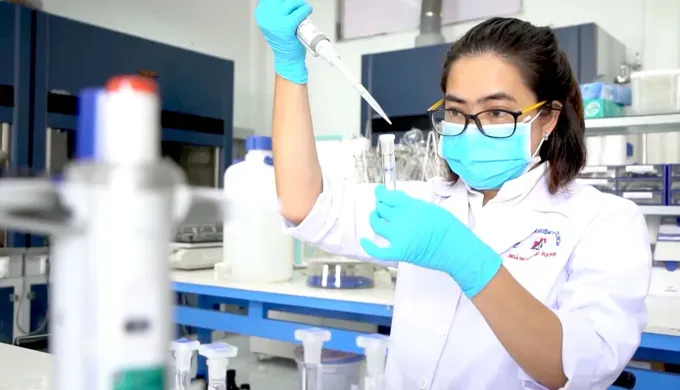The Ho Chi Minh City Food Safety Authority has issued a consumer warning against certain dietary supplements currently under investigation. The alert rekindles public concern after a series of hazardous ingredients were previously discovered in various slimming teas and weight-loss products.

Most recently, on October 13, Vo Thi Ngoc Ngan—known as “Ngan 98”—was prosecuted and temporarily detained for “producing and trading counterfeit food products.” Investigators found that she had partnered with several factories in Hanoi to commission the manufacture of so-called “health supplements” for weight loss.
Forensic analysis by the Institute of Criminal Science (Ministry of Public Security) confirmed that some collagen tablets contained sibutramine and phenolphthalein. Both substances are classified as banned ingredients in the production and sale of health supplements under regulations of the Ministry of Health.
According to pharmacist Le Phuoc Thanh Nhan, Head of Pharmacy at Le Van Thinh Hospital, sibutramine was once used as an anti-obesity drug but was later withdrawn for significantly increasing the risk of heart attacks. It also affects the nervous system, causing anxiety, agitation, hallucinations, and in severe cases, brain damage or stroke.
Phenolphthalein, formerly used in laxatives, is now banned for its cellular toxicity and potential to cause cancer, organ damage, and DNA mutations.
In 2010, Vietnam’s Drug Administration under the Ministry of Health halted all imports of sibutramine. A year later, authorities suspended circulation, revoked all registrations, and ordered the recall of every product containing the substance. Around the same time, the U.S. Food and Drug Administration (FDA) and the European Medicines Agency (EMA) also withdrew sibutramine-based drugs from the market.
Despite these bans, the substance continues to surface in dietary supplements because of its powerful appetite-suppressing and rapid weight-loss effects.
In 2025, the Food Safety Department under the Ministry of Health issued another national alert after detecting sibutramine, desmethylsibutramine, and didesmethylsibutramine in “Hong Hac Phuc Linh” slimming capsules—a so-called health supplement. Earlier tests had also found sibutramine in “Dang Xuan Phuc Linh Gold” and “Best Slim Collagen.”
In 2024, Bach Mai Hospital in Hanoi treated a patient in critical condition after using “Detox Tao,” a weight-loss supplement containing sibutramine. In November 2024, “TIGI MAX PLUS” health supplement was found to contain both sibutramine and phenolphthalein. In December 2022, sibutramine was again detected in the weight-loss product “Poria Super Model.”
According to Associate Professor Pham Dinh Luyen, former Head of the Department of Pharmaceutical Management, Faculty of Pharmacy, University of Medicine and Pharmacy Ho Chi Minh City, sibutramine and other banned substances can still cross the border through smuggling routes, hand-carried shipments, or disguised as other chemicals.
Fraudulent facilities deliberately mix banned substances into products after they have been granted publication licenses to evade initial testing, or frequently change packaging, formulas, and company names to avoid regulatory authorities. He also noted that the scale of dietary supplements circulating in the market is very large, with new products being launched at a rapid pace, creating significant pressure on regulatory agencies in terms of monitoring and periodic testing.
Most findings of banned substances in dietary supplements are based on proactive surveillance, after poisoning incidents, or through investigative operations.
In reality, accessing and inspecting dietary supplement production and business facilities is not easy. In May, the Ho Chi Minh City Food Safety Department inspected N-Collagen Import-Export Company (formerly in District 8, now in Phu Dinh Ward), but the company site had already ceased operations. Testing is the only way to determine whether a product is of poor quality or contains harmful substances. However, the capacity of current testing centers is uneven; sometimes a product must be sent to multiple centers to obtain complete results, causing delays.
Meanwhile, testing costs are high, payment procedures are complicated, and if no violations are detected, the budget has no basis for reimbursement. This reality makes many units reluctant to conduct testing even when risks in products are identified. As a result, with more than 3,000 dietary supplement production and business facilities and over 12,000 products currently circulating nationwide, management faces enormous challenges.
The Ministry of Health is finalizing a draft decree to replace Decree No. 15/2018/ND-CP, aiming for stricter regulation of food production and business activities, enhancing decentralization and eliminating cumbersome, and overlapping procedures. This is expected to address loopholes in management and contribute to cleansing the dietary supplement market, thereby protecting consumer health.
























